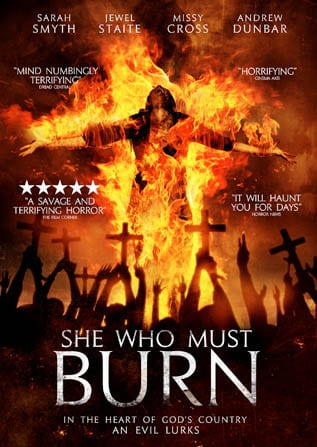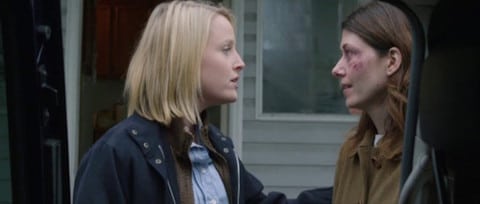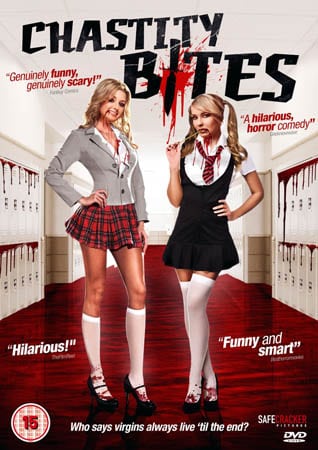She Who Must Burn (2015)
Directed by: Larry Kent
Written by: Larry Kent, Shane Twerdun
Starring: Jim Francis, Missy Cross, Sarah Smyth, Shane Twerdun
Canada
AVAILABLE NOW: on AMAZON VIDEO and iTUNES
RUNNING TIME: 90 min
REVIEWED BY: Dr Lenera, Official HCF Critic

In his clinic, a doctor is killed by anti-abortion protestor Abraham Baarker, who is arrested soon after. The surgery is shut down and Angela, a nurse who worked there, opens a clinic of her own where she provides basic services for women in the community, something which puts her at odds with local pastor and Abraham’s son Jeremiah, who heads an extremist evangelical family which also comprises his sister Rebecca and her weak willed husband Caleb. They believe that she is performing abortions, and also, because she “lives in sin” with her boyfriend Mac, that she’s to blame for recent infant deaths which are more likely the result of chemicals in the water. People begin protesting outside their house, but things really start to heat up when Jeremiah’s abused wife Margaret comes to Angela for help….
Almost seeming like a product from the 70’s, She Who Must Burn also seems like it’s the work of a first time film director, full of energy, passion and lots to say. Having sadly never heard of Canadian filmmaker Larry Kent, I was very surprised to find out that Kent is actually 78, which is even older than George Miller. A quick look at his resume indicates that he’s been making interesting pictures on and off for over 50 years now though they don’t tend to be seen much outside of Canada. She Who Must Burn is quite a powerful piece of filmmaking and in an ideal world ought to get Kent noticed. Following on from such films as Red State and The Sacrament, it’s a chilling, intense and uncomfortable attack on religious fundamentalism [a subject that is especially important today and I did wonder why there haven’t been some films attacking Isis until I realised that the makers of those films would probably not be with us anymore], emphasising especially the struggle for women’s rights in a community where the basic ideas of Christianity have been twisted into something almost unrecognisable from its original form. It does this in the form of a slow burning thriller which becomes more and more of a horror film and which gradually tightens the noose more and more.
“Can I help you? Do you have an appointment”? are the first words you hear just before a doctor is shot dead. The perpetrator starts to sing Amazing Grace and the titles roll, over which a song is heard, one of several imitations of Christian spiritual songs played throughout which wickedly parallel what is taking place on screen and in the minds of three of the main characters. These three characters are Jeremiah Baarker, who is dedicated to stamping out the “evils” of abortion and birth control, the latter so much that he uses his wife Margaret’s face as a punching bag when she tells him she’s been taking the pill. He believes he’s doing the Lord’s work, which apparently also includes using her for procreative sex whenever he wants despite any objections she may have. Then there’s Jeremiah’s unhinged sister Rebecca and her husband Caleb, who doesn’t seem to be “strong” enough for the others. The three are introduced in a really rather upsetting scene where Rebecca is about to have a baby which is probably going to be born dead. One especially nasty little detail has her face looking like it’s been hit, perhaps by her brother. The child is born as expected and Rebecca then has to bury it. She begins to sing a prayer which turns into what can only be described first as “gooblygook of despair” and then almost satanic chanting. All this is quite hard to watch and I wasn’t really enjoying the first part of the film, but then again I don’t think Kent meant for me to enjoy it. He meant for me to be disturbed and to truly hate the Baarkers, especially Jeremiah who soon wound me up so much that I wanted him to die the most horrible death possible, and I certainly admired his verve.
Despite being an unmarried woman sharing a bed with her cop boyfriend Mac, Angela decides to remain in this god-forsaken [despite it thinking it’s exactly the opposite] community which seems to support the Baarkers, from egg-throwing demonstrators with placards hanging around outside their house to even the Sheriff who says to Angela: “You can’t win”, and, despite being fully aware of what Jeremiah and his family are doing, doesn’t seem to want to help much when things begin to get hairy. The clinic Angela’s been running has even had its funding cut by the State after considerable pressure from the Religious Right. When Margaret turns up on the doorstep of Angela’s clinic bruised and bloody, she gets her to safety, almost setting up a red herring in the plot as the viewer will probably expect some action to revolve around Jeremiah’s efforts to get his wife back. Instead, it’s a pregnant 13 year old girl whom Margaret sends off to have an abortion which really spurs the Baarkers into action.
There’s a really good scene when Jeremiah pays Angela a visit. Jeremiah is so scary, and seems to possess so much evil power, that it’s not much different from, say, that scene in The Devil Rides Out when Mocata visits the Eatons and tries to exert his power on Marie Eaton. I’ll say this right now: Shane Twerdun, who also co-wrote the screenplay and who plays Jeremiah, is one of the most convincing and downright hateful screen villains in ages. He’s always believable in his absurd self-righteousness and slimy, almost mocking air that never leaves him even when he himself is in danger. She Who Must Burn may move too slowly for some but its final act is sufficiently hair-raising and the finale actually quite surprising. The scenes of brutality tend to show more the aftermath than the event but are quite nasty all the same. However, it’s hard to see what’s going on in some of these climactic scenes due to the shaky camerawork, to the point where I actually had to rewind the screener I had at one point because I honestly didn’t have a clue what had just happened. Even defenders of this style of filmmaking must admit that if you don’t know what’s just occurred onscreen then it causes a bit of a problem. The handheld camerawork is quite loose and jerky throughout which at times becomes really distracting. It’s fine if the director of a film wants to give the impression of a documentary, but when it ends up taking attention away from certain scenes then it’s being overused.
Still, the setting, an impoverished town where you obviously can’t get anything resembling an internal signal, is well evoked, the dreary weather adding to the feeling of bleakness, and you’ll certainly believe that the events depicted could easily occur and may very well be occurring some place in America right now. Kent doesn’t make any excuses for his villains, and his total lack of attempt to tone down his anger at his targets is undeniably commendable in a time when so many writers and directors seem to feel the need to do such a thing and try not to upset anybody too much. However, their depiction struck me as being just a little bit simplistic. Yes, this family is very plausible, but I would have liked for Kent and Twerdun to have gone into just a bit more depth concerning them, especially concerning their dominance of the town. It almost feels like they’ve only scratched the surface, but I suppose you could also say that this is a good thing because the film leaves you wanting to know more. One thing that is especially interesting is how bad it makes anti-abortion protestors look and I wouldn’t be surprised if this film could lead to a few heated arguments in households.
The score by Chris Alexander is quite unnerving, closer to sound effects really as it simmers away in the background offering strange noises and snatches of instrumentation. There’s some unusual use of audio here and there, most notably in a scene where Rebecca is being spoken to and you can just make out echoes of some of what the other people are saying. Missy Cross as Rebecca almost matches Twerdun, her broader acting contrasting nicely with his. He may be mad, but he’s totally controlled, while she’s clearly going totally off the rails. Then again, there were times during this film where I felt like going mad myself, because it made me so angry. Despite my issues with some of the filmmaking style and slight lack of depth in some aspects, Kent has turned out an admirably impassioned and really rather important work here which deserves to be seen by as many as possible, even they don’t agree with some of it….though it may make haters of religion become even more against the idea of worship. For me, someone who isn’t religious but who was brought up a Christian and therefore does have a bit of respect for it in its more palatable incarnations, I saw it first and foremost as a terrifying example of how belief can go totally wrong, and was reminded of how it’s this, rather than belief itself, which is the cause of more problems in this world throughout history than anything else.
Rating: 















Be the first to comment